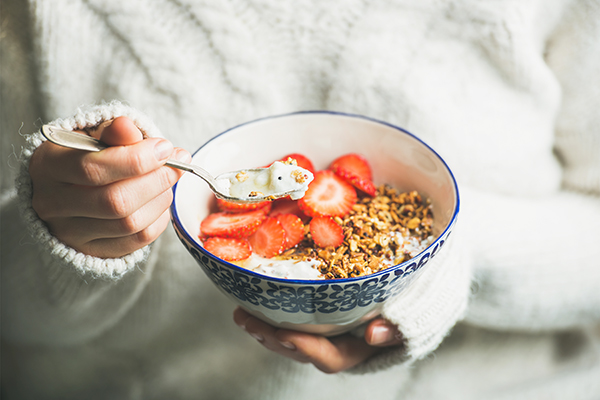Darin Olien: Why Gut Health Matters and How to Improve It

When you hear the words “gut health,” the basic digestive process may be the first thing that comes to mind: Break down food and eliminate waste.
In recent years, we’ve learned more and more about how the gut can impact our overall health — with emerging research trying to determine if there’s a link between a healthy gut microbiome and weight management, emotional well-being, skin health, and immune function.
In other words, our gut may play a much bigger role in more aspects of our health than we thought. And maintaining a healthy gut is key.
According to Darin Olien, Shakeology co-creator and star of the Netflix docuseries, “Down to Earth with Zac Efron,” occasional digestive issues can often be the first sign that your gut may be out of whack.
“It’s all about balance in your microbial world,” says Olien. “When you have bacteria that are overrun with processed foods and stress, it creates dysbiosis, bloating, and irregularity.”
Read on and watch his interview to learn how the right foods can support a healthy gut — so your gut can support you.
The Beneficial Bacteria in Your Gut
There are trillions of microbial cells that can live in the gastrointestinal tract, including as many as 300 to 500 species of bacteria.
This ecosystem is known as the gut microbiome.
Everyone’s microbiome is as unique as their fingerprint, but generally speaking, a healthy microbiome will include a wide variety of beneficial bacteria.
These good bacteria help the body digest food and absorb nutrients.
Certain gut bacteria synthesize vitamins like vitamin K, thiamine, and folate.
“The good bacteria is actually breaking down the food. When you don’t have enough good bacteria, you are not getting all of the nutrients and phytonutrients that you just took in,” explains Olien.
Good bacteria can also help to keep the “bad” bacteria in your gut in check, which can help you sidestep certain digestive issues.
When your microbiome is in balance, it can help to maintain overall health.
But occasionally, when your gut gets out of whack, you may start to notice unpleasant effects.
As expected, that may include tummy troubles like gas, bloating, or discomfort.

How Probiotics Support a Healthy Microbiome
What you eat has a profound effect on your microbiome. (No surprises there!)
You can help support a healthy balance of gut bacteria by including probiotics in your diet each day.
Probiotics are live bacteria found in fermented foods like yogurt, kefir, kimchi, and kombucha.
When you eat foods that contain probiotics, you add to the population of good bacteria in your gut to help maintain a healthy balance.
For thousands of years, civilizations relied on fermentation as a way to preserve food year-round. But as we found more advanced methods of food preservation, we started eating fewer fermented foods.
Consuming probiotics — either through your diet or via a supplement — can help reintroduce those good bacteria to your gut.
But probiotics only tell half the story.
To help those good bacteria grow and flourish, you also need to pay attention to prebiotics.

The Role of Prebiotics in Gut Health
Prebiotics are plant fibers found in many fruits, veggies, and whole grains. Prebiotics act as food for the good bacteria — think of them as fertilizer for a healthy microbiome.
In his travels, Olien found two particularly good sources: Yacon root, from deep in the rugged Andes, is an abundant source of key prebiotic fibers.
And chicory root, used traditionally by ancient Egyptians, supplies the prebiotic fiber inulin.
Beyond fiber, certain plants also provide flavonoids, a plant compound with antioxidant properties.
Some of the richest sources of flavonoids Olien has identified include matcha from Japan, cocoa from West Africa, and camu camu from the Amazon River region.
Like prebiotics and probiotics, these flavonoids can help to support a healthy gut.
Watch the video above to find out more about how your gut can affect your overall health and the best ingredients from around the world to help support your microbiome.
